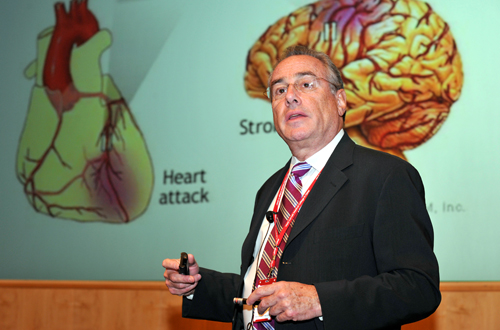Save Your Brain from Stroke and Dementia
Weill Cornell Expert Suggests Ways to Reduce Risk Factors
October 19, 2010

Dr. Matthew Fink of NewYork-Presbyterian Hospital/Weill Cornell
Medical Center in New York explains how reducing cardiovascular risk
factors can help prevent life-threatening strokes and dementia.
Advances in biomedical knowledge and technology have made it possible to prevent many strokes or “brain attacks,” which have long been a leading cause of death and disability worldwide.
One of the most important ways to prevent stoke is to maintain a normal blood pressure, according to Dr. Matthew Fink, professor of and interim chair of the Department of Neurology and Neuroscience and chief of the division of stroke and critical care neurology at NewYork-Presbyterian Hospital/Weill Cornell Medical Center. High blood pressure is a factor in nearly 70 percent of strokes, says Dr. Fink, who talked about ways to prevent stroke and dementia Tuesday at a program sponsored by Weill Cornell Medical College as part of its Medicine & U Public Lecture Series.
Guarding against high blood pressure requires regular screening tests because it usually doesn’t have symptoms. If it is high, then taking steps such as medication, quitting smoking, improved diet, regular exercise and weight reduction can help lower it.
Heart disease is another risk factor for stroke, says Dr. Fink; and it, too, can be modified by quitting smoking, better diet, more exercise, and regular health screenings that check for high blood pressure and high cholesterol.
Modifiable Risk Factors for Stroke |
|
Preventive measures to save your brain from stroke is important because stroke leaves about 30 percent of survivors needing help caring for themselves and leaves 18 percent needing to be institutionalized.
Multiple strokes can also be a cause of dementia, which in the United States affects about eight percent of people over age 65. So the risk for dementia can also be modified by health screenings that check for high cholesterol and high blood pressure, by quitting smoking, a healthy weight and healthy diet and regular exercise.
Eliminating cardiovascular risk factors not only helps prevent stoke, it can help reduce the risk of dementia in later life, says Dr. Fink. Further, keeping busy mentally and avoiding sedentary lifestyles could reduce the chances of developing dementia.
By Kristina Goodnough
Read this report in Arabic
